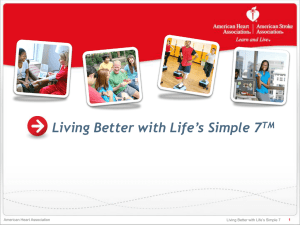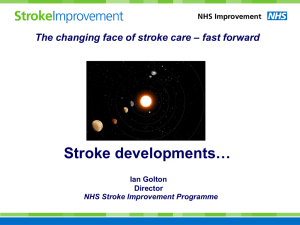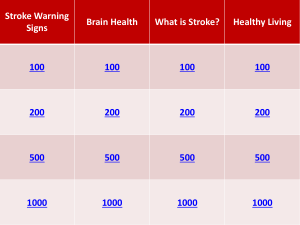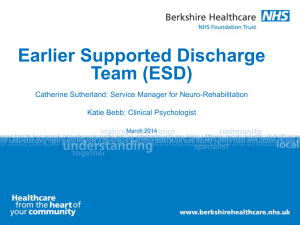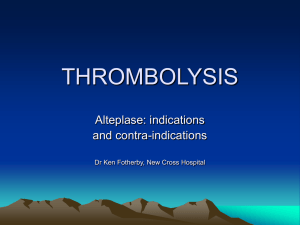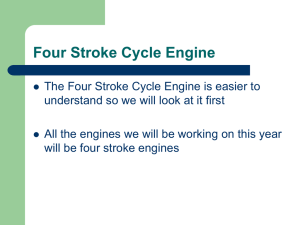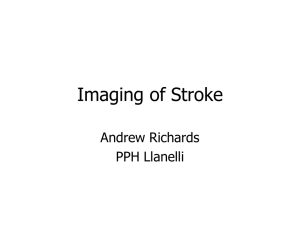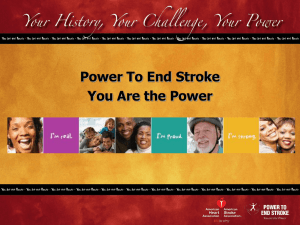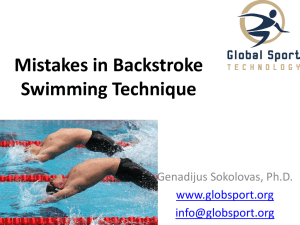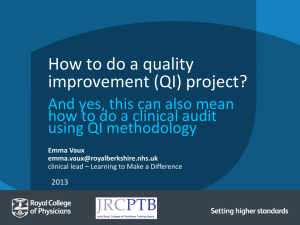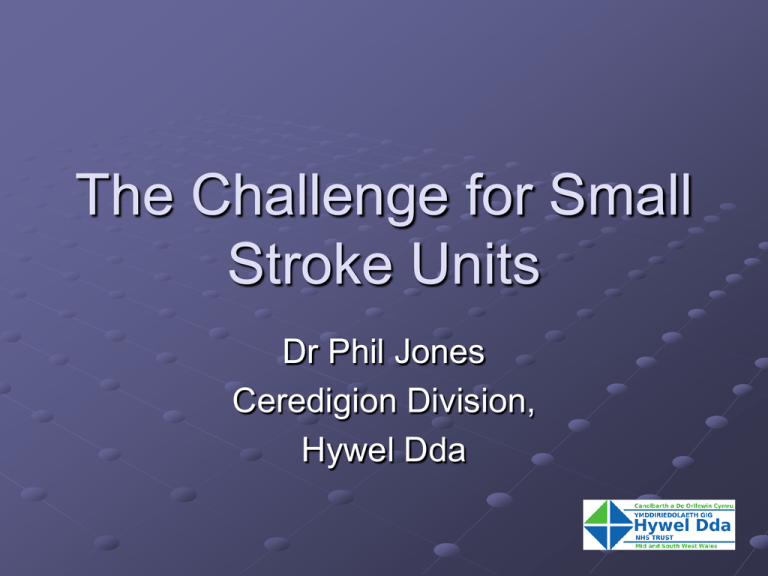
The Challenge for Small
Stroke Units
Dr Phil Jones
Ceredigion Division,
Hywel Dda
The Ceredigion Challenge
Catchment population around 100,000
Catchment population ranges from South Gwynedd to
South Ceredigion and across to Rhayader
Annual stroke admissions about 120
Plus attendances at rapid access stroke service
The Ceredigion Challenge
Travel Times to admitting DGH (Bronglais,
Aberystwyth) variable:
short for local patients
2 hours plus for more distant residents
The Ceredigion Challenge
Local service infrastructure:
4 acute monitoring beds
11 rehabilitation beds in BGH
Staffing
Physio, OT, SALT, nursing staff, consultant
others as required
The Ceredigion Challenge
What we don’t have:
Specialist nurse/therapist
Community based stroke service
Thrombolysis service
Commissioned services for stroke patients
The Ceredigion Challenge
Participation in Sentinel audit since inception.
Organisational change as far as possible.
The Ceredigion Challenge
How did we do in the 2006 RCP Audit?
Standards 1 + 2
1 More than 50% of stay is in Stroke Unit
We do not have a designated stroke unit, we
are classed as stroke and rehabilitation.
2 Treated in Stroke Unit at some point
during stay
25% treated outside of Ystwyth
75% treatment included stay on Ystwyth
Assessment and Diagnosis
Standards 3+4
3 Swallowing assessed within 24 hours of admission
National Average
Our site
66%
88%
4 Brain scan within 24 hours of stroke
National Average
Our Site
(within 3 hours = 10%)
42%
30% (median = 27 hours)
Brain scan within 24 hours of admission
National Average
Our Site
53%
74%
Secondary Prevention (10 and
5)
5 Receiving aspirin by 48 hours after stroke
National Average
60%
Our Site
83%
10 on any antithrombotic agent by discharge
National average
100% Our site
100%
On 1 or more antihypertensives by discharge
National Average
88%
Our Site
91%
On warfarin for AF by discharge
National Average
92%
Our Site
100%
On lipid lowering therapy by discharge
National Average
79%
Our Site
69%
Multidisciplinary Assessment (6 +
7)
6 PT assessment within 72 hours of admission
National Average 71%
Our Site
63%
7 OT assessment within 7 days of admission
National Average 68%
Our Site
57%
Communication assessed by SALT within 7/7
National Average 69%
Our Site
79%
Social Work Assessment within 7/7 of referral
National Average 56%
Our Site
14%
Risk factor management
Underlying cause for stroke identified
National Average
73%
Our Site
88%
Our Site
100%
80%
Our Site
0%
41%
Our Site
50%
42%
Our Site
25%
Smoking Cessation (N=1)
National Average
79%
Alcohol Reduction (N=1)
National Average
Exercise (N=6)
National Average
Diet (N=16)
National Average
Research
Patients entered into research trial
National Average 3%
Our Site
20%
The Thrombolysis Challenge
100% of stroke patients require the basic assessment and rehabilitation
services at a local level.
2006 RCP audit shows that 0.2% of patients were thrombolysed in that round
of audit. 40 sites across Engalnd and Wales offered the services, 25% did not
thrombolyse in 12 months. 2 patients were thrombolysed in Wales.
We must not confuse the thrombolysis issue with the holistic management of
stroke.
Ceredigion Position
Emergency services:
Consultant led 0900-1700.
Speciality doctor led 1700-0900 and at weekends.
Rapid local access to CT scanning services in hours and out of
hours.
Provision of acute monitoring facilities.
Complete lack of commissioning intent.
The NHS in Wales Challenge
NHS ethos of care is free at point of delivery and local access to
services.
Moving away from the “post-code” lottery.
The challenge for the NHS in Wales is to support these principles
through support for local care where it can be effectively delivered.
The SITS-MOST data demonstrates that experience and high
volume of activity does not confer a significant advantage in the area
of thrombolysis.
Conclusion
The challenges facing smaller stroke units
are different to those facing larger stroke
units.
Where is the evidence that smaller stroke
units provide an inferior level of care to
larger stroke units?
Services should be
judged/commissioned on quality
not quantity

